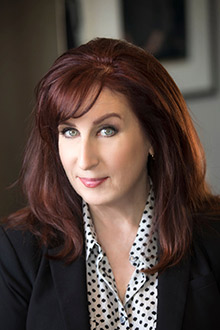
Since joining Emory last spring, Maryn McKenna has worked to develop and teach courses and skills workshops on health and science communication, addressing writing, multimedia storytelling and public persuasion.
Renowned health and science journalist Maryn McKenna, senior fellow in health narrative and communication in Emory College's Center for the Study of Human Health, has received highest honors in the 2019 AAAS Kavli Science Journalism Awards.
McKenna received the Gold award in magazine writing for her piece in The New Republic on the impact of right-wing nationalism on global public health. The Kavli awards, administered by the American Association for the Advancement of Science (AAAS), recognize distinguished science reporting for a general audience.
McKenna's April 2019 article, “The Plague Years: How the rise of right-wing nationalism is jeopardizing the world’s health,” took a comprehensive look at the global history of public health and disease outbreaks, drawing parallels between today’s public health crises and a global rise in political and religious nationalism.
She confronted many of the misconceptions that have been popularized by right-wing nationalist groups and debunked them with a series of carefully researched case studies. The spread of misinformation has led to a global crisis that needs immediate attention, McKenna found.
“We are always at risk of a new disease breaking out, or a previously controlled one surging back," she wrote. "What’s different now is that the rejection of scientific expertise and the refusal to support government agencies leave us without defenses that could keep a fast-moving infection at bay.”
"To receive the AAAS-Kavli is a career-defining honor. I’m so grateful to the organization, the foundation and the jury of science journalists who chose my work for this recognition," McKenna says.
"I’m especially grateful to have this story recognized because it exemplifies what I have always tried to do as a public health journalist: It traces the origin of health problems back to the social and political conditions that cause the problems to arise," she adds.
Since joining Emory last spring, McKenna has worked to develop and teach courses and skills workshops on health and science communication, addressing writing, multimedia storytelling and public persuasion.
"I hope to help students explore that problems in health — whether personal health or public health — are always multi-factorial, and that it’s our job as researchers and writers to expose those connections, and correct the deficits that cause those problems to occur," McKenna says.
With the work of McKenna and others, the Center for the Study of Human Health is seeking to build out more courses and other offerings around health and science storytelling, including — but not limited to — full and short courses in health and science writing, trainings in public speaking and storytelling, and events that bring noted health and science journalists, authors and storytellers to campus, says Michelle Lampl, Charles Howard Candler and Samuel Candler Dobbs Professor of Anthropology and director of the Center for the Study of Human Health.
The Kavli awards program, endowed by The Kavli Foundation and open to journalists worldwide, will celebrate its 75th anniversary in 2020. There were entries from 47 countries this year.
“Writing about disease outbreaks can feel like a narrative trap; it’s difficult to describe them without making them all sound the same," McKenna says. "I’m grateful to my editor Sasha Belenky and The New Republic for allowing me to uncover the deep connections between the outbreaks in this story: nationalist politics’ undermining of public health around the world.”
A Gold Award ($5,000) and a Silver Award ($3,500) are presented in each of eight categories. Independent panels of science journalists select the winners. The winners will receive their awards at a Feb. 14 ceremony held in conjunction with the 2020 AAAS Annual Meeting in Seattle.
“Congratulations to the winners,” says Alan Leshner, interim AAAS chief executive officer. “The diversity of the stories is impressive and shows the power of good journalism to illuminate important issues in science and society.”
